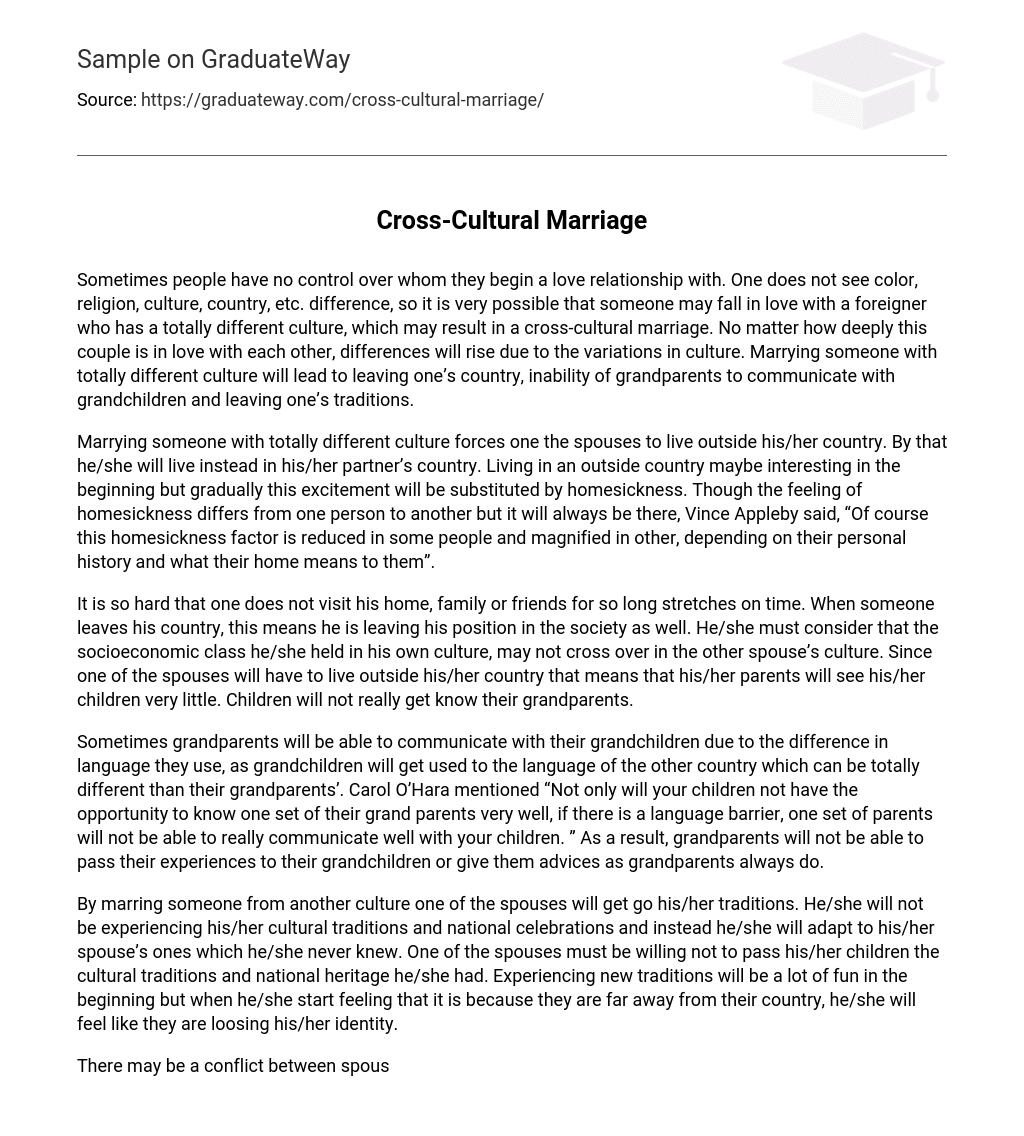Sometimes, individuals have no control over their choice of partner in a romantic relationship. They are blind to disparities in color, religion, culture, or country. Consequently, it is plausible for one to develop affection towards a foreigner with an entirely distinct culture, leading to a cross-cultural marriage. Despite the profound love shared by the couple, cultural discrepancies will emerge. Marrying an individual from an utterly dissimilar culture necessitates leaving one’s homeland and poses challenges in grandparent-grandchild communication as well as forsaking one’s customs.
When individuals from different cultures marry, one spouse is required to leave their home country and reside in their partner’s country. At first, living abroad can be captivating, but eventually, this enthusiasm gives way to a yearning for home. The experience of homesickness varies among individuals but remains constant. According to Vince Appleby, the intensity of homesickness is influenced by personal background and the importance of one’s home: “The level of homesickness may decrease or increase depending on an individual’s personal history and emotional connection with their home.”
Being away from home, family, and friends for extended periods is highly challenging. Departing one’s country also means leaving behind one’s societal status. It is crucial to recognize that the socioeconomic class held in one’s own culture may not carry over to their spouse’s culture. Moreover, when one partner has to reside outside their homeland, their parents’ interaction with their children becomes limited. Consequently, this leads to a weak bond between grandchildren and grandparents.
Carol O’Hara suggests that a language barrier can impede communication between grandparents and grandchildren. This is due to the grandchildren being accustomed to a different language than their grandparents. Consequently, the grandparents are unable to share their experiences or provide advice to their grandchildren, which is typically part of their interaction.
When individuals from different cultures marry, they will embrace their partner’s traditions and let go of their own. Consequently, they will no longer partake in their original cultural customs and national festivities but instead adapt to unfamiliar practices. It is crucial to relinquish the transmission of one’s cultural traditions and national heritage to future generations. Despite the initial enjoyment, adopting new traditions will eventually lead to a sense of detachment from one’s homeland, ultimately resulting in an identity loss.
In marriages involving individuals from different cultures, conflicts may arise regarding which culture to pass on to their children. Christine Benlafquih argues that even couples of the same culture can clash over parenting issues, such as discipline techniques. However, intercultural marriages present additional parenting challenges, including the decision of whether or not to raise bilingual children. Conversely, some individuals hold differing opinions regarding cross-cultural marriages and believe that the benefits outweigh the drawbacks. Such marriages can foster a greater understanding of people and aspects beyond our own cultural borders.
The article “Marrying into a different nationality” proposes that marrying a person from another country enables individuals to foster tolerance and embrace unfamiliar experiences. Nonetheless, one can acquire knowledge about diverse cultures through research or travel without having to completely abandon their home country. It is crucial to acknowledge that fully leaving one’s home country could lead to a loss of personal identity, as individuals may never consider the new country as their true home and may constantly feel like outsiders.
According to the belief, cross-cultural marriage can be improved by encouraging laughter within the family. This is because spouses and children from different cultures can find amusement in each other, which helps to resolve cultural misunderstandings. However, people from diverse cultures may not always share the same sense of humor, causing difficulties in understanding each other’s sources of amusement. As Carol O’Hara points out, a joke that makes one person laugh may not have the same effect on another person and may require an explanation.
To summarize, marrying someone from a different culture can be an exhilarating experience due to the potential for encountering distinct and unfamiliar situations. It is important to note, however, that these novel experiences can also lead to conflicts and misunderstandings between partners. Consequently, it is advised not to hastily pursue a cross-cultural marriage unless individuals are prepared to relinquish their own traditions, acknowledge that their children may not completely grasp their parents’ cultural heritage, and be receptive to residing outside of their homeland.
One should consider many factors and gather information before deciding to marry someone from a different culture (Appleby, Vince. “Marrying someone from another country.” International Pen Pal. 2009. 10 May 2009. Benlafquih, Christine. “Tips for Successful Intercultural Relationships.” Suite101. 27 Mar 2008. 10 May 2009. “Marrying into a Different Nationality.” Professor’s House. 10 May 2009. O’Hara, Carol. “Are you thinking of marrying someone from another culture.” Positively Feminine. 10 May 2009.)





